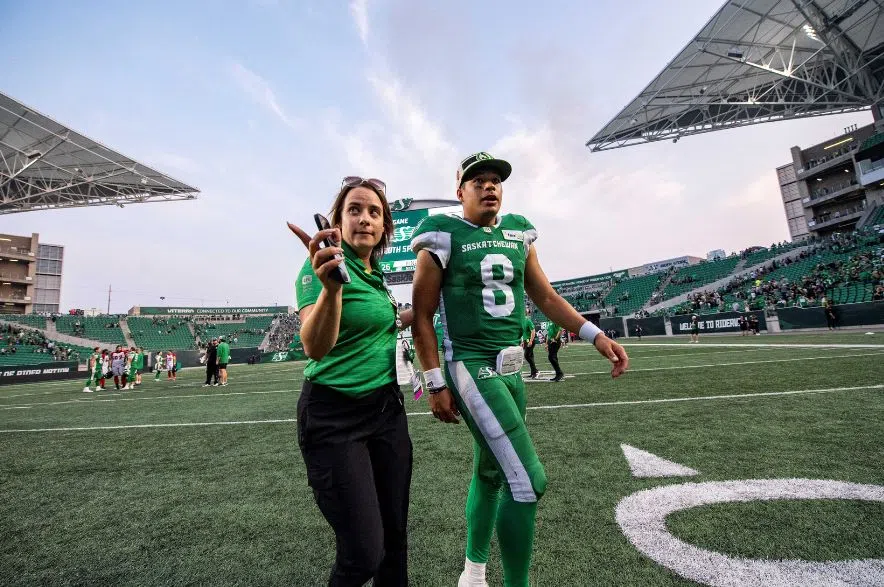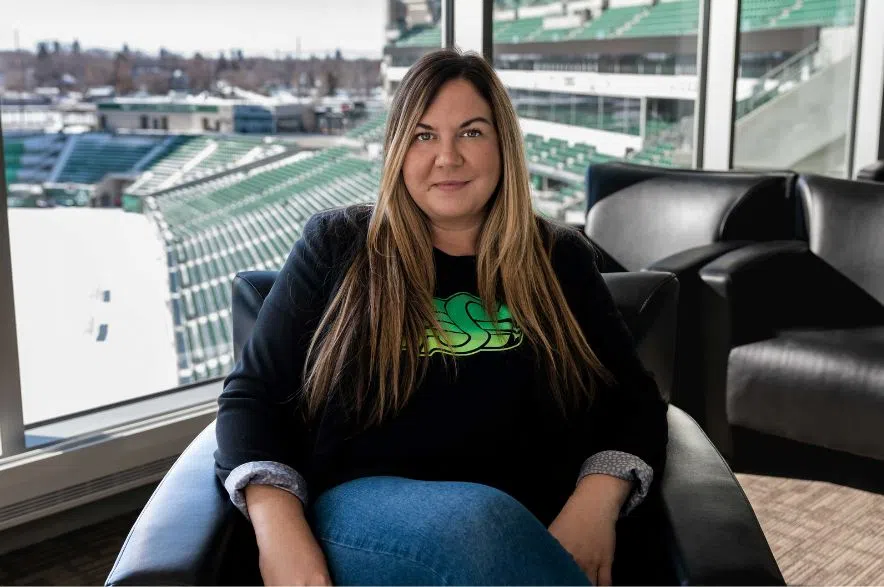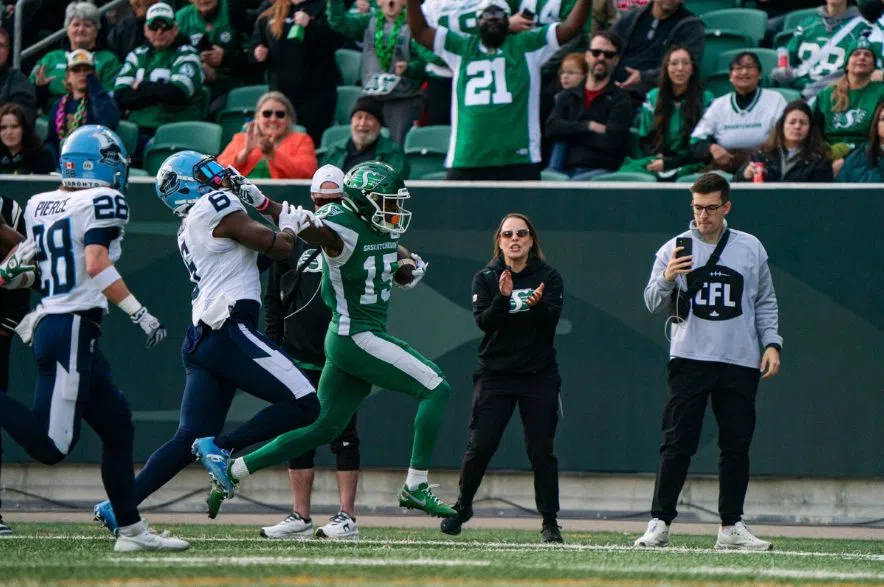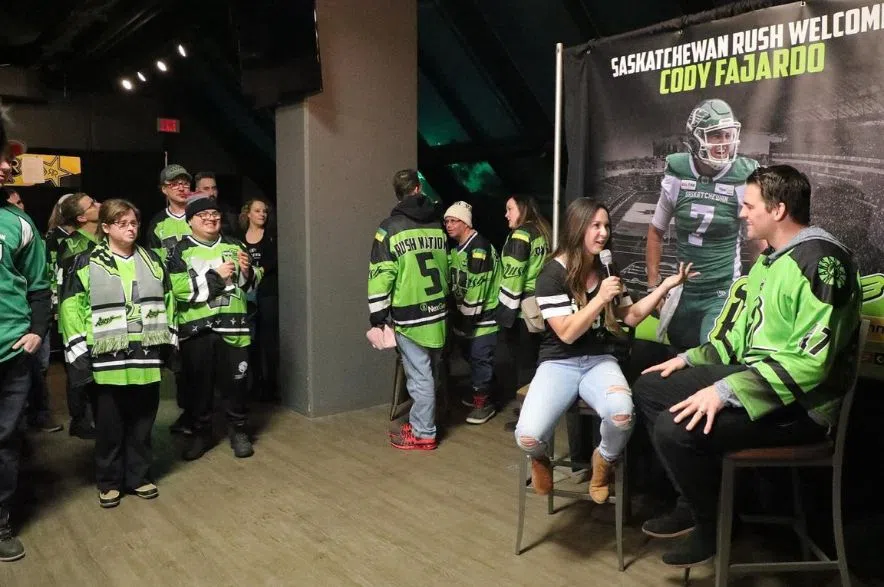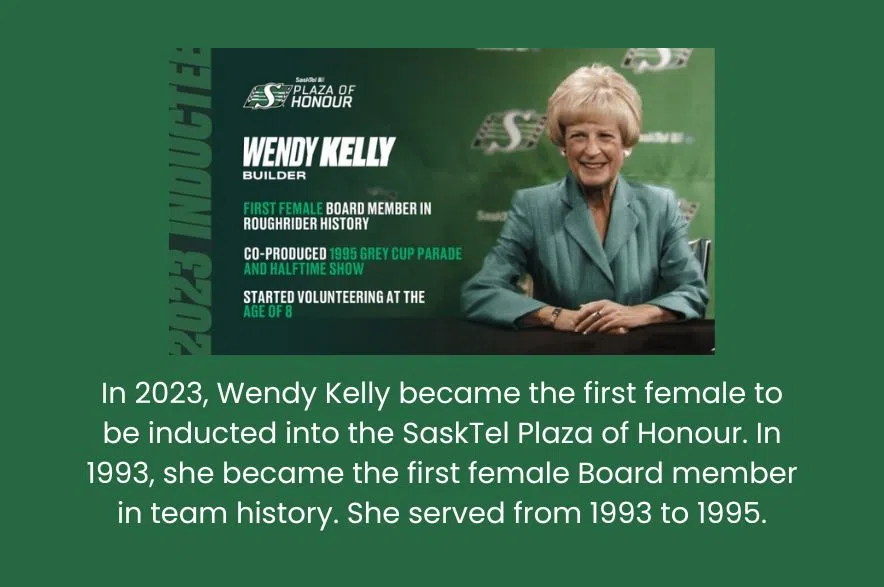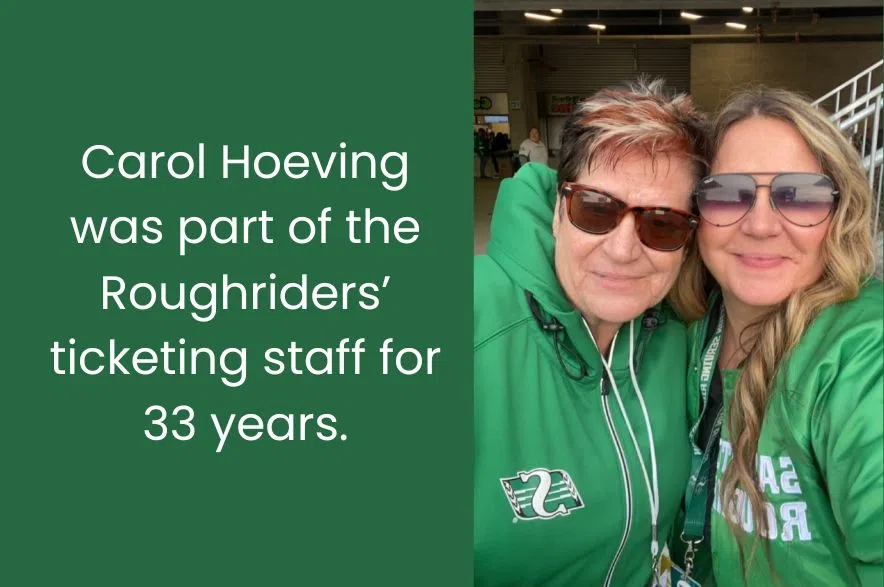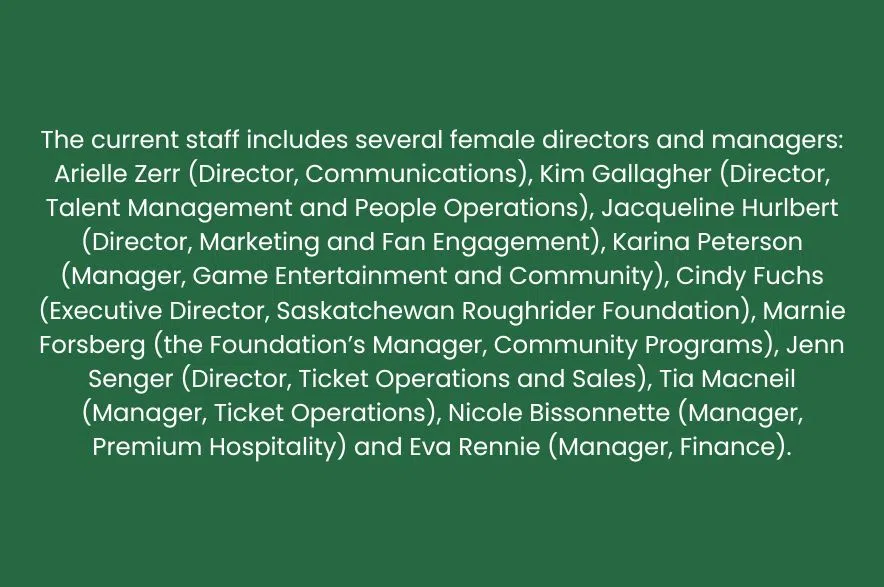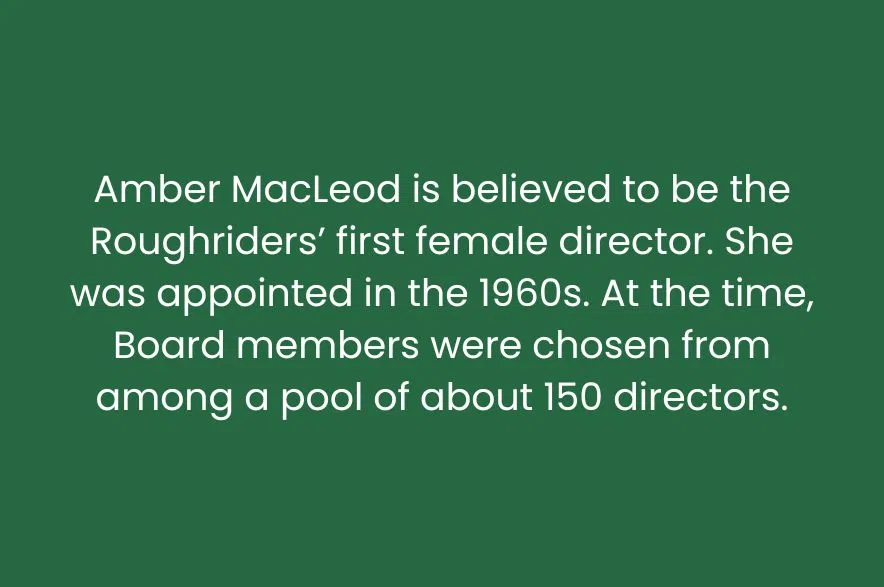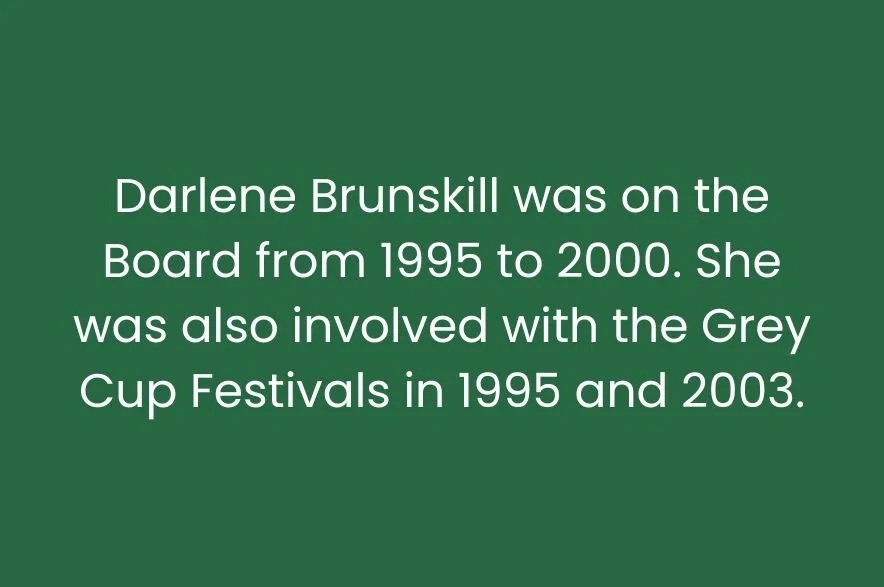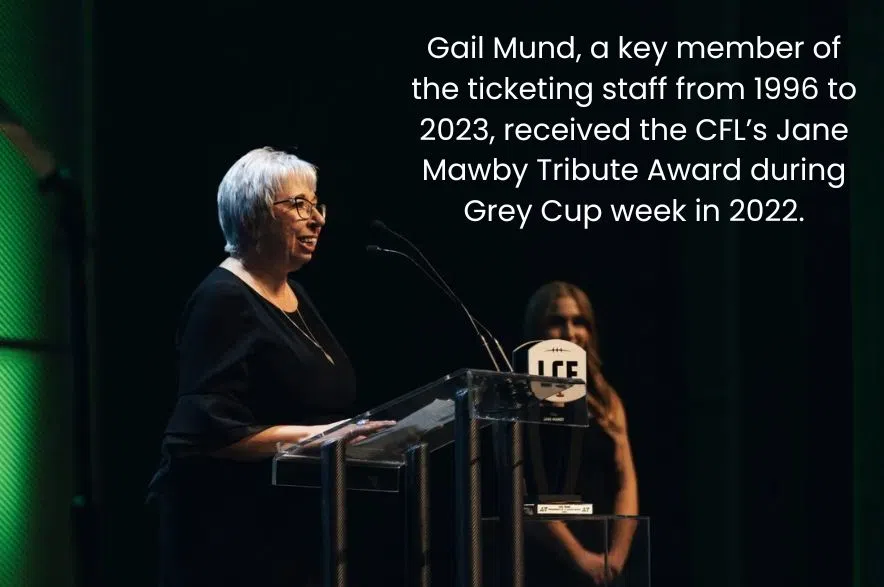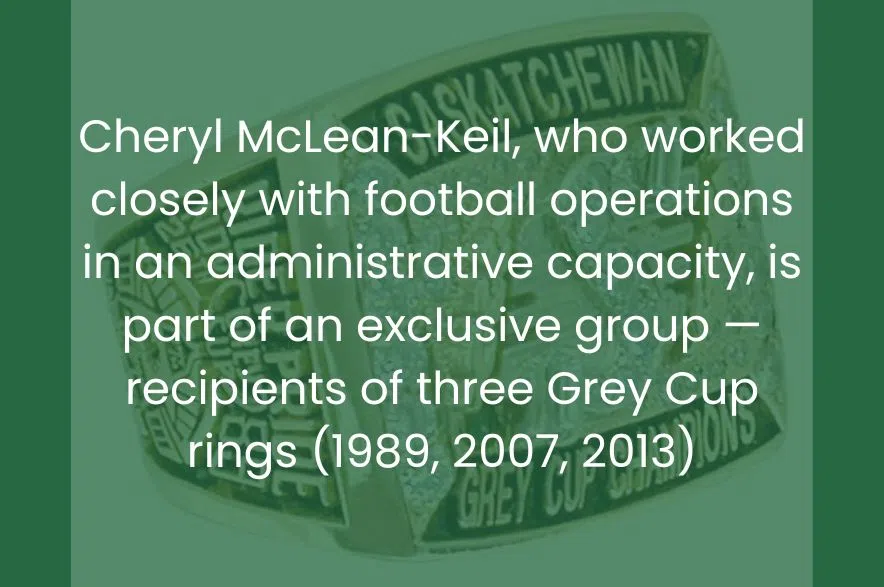When you think of the Saskatchewan Roughriders, you likely imagine the team on the field at Mosaic Stadium.
The sharp snap of the ball, hard-hitting tackles, and the roar of 30,000 fans.
The roster is made up entirely of men, and traditionally, the sidelines and locker rooms have reflected that. But behind every touchdown, every play call and every cheer from the stands, there’s an often-unseen force pushing the team forward: women.
Listen to Arielle Zerr and Jennifer Senger on Behind the Headlines:
Read more:
- Tackling low literacy rates: Sask. Roughrider inspires kids to read
- No Baby Unhugged: JPCH volunteers bring comfort to NICU babies
- Saskatoon restoration breathes new life into historic Hanley home
Despite football being a male-dominated industry, the Saskatchewan Roughriders are bucking trends, as 28 of the 49 employees at the executive leadership or administrative levels within the club are female.
Ahead of International Women’s Day on Saturday, 650 CKOM spoke with two women who play a critical role in the Saskatchewan Roughriders’ success: Arielle Zerr, the team’s director of communications, and Jennifer Senger, the Riders’ director of ticket operations and sales.
In this Q&A, these women share their journeys, their experiences, and the challenges they’ve faced while carving out a space for themselves in this fast-paced, high-pressure field.
While the 13th man is often celebrated in Rider Nation, these women are the backbone, supporting the team in every facet of the game.
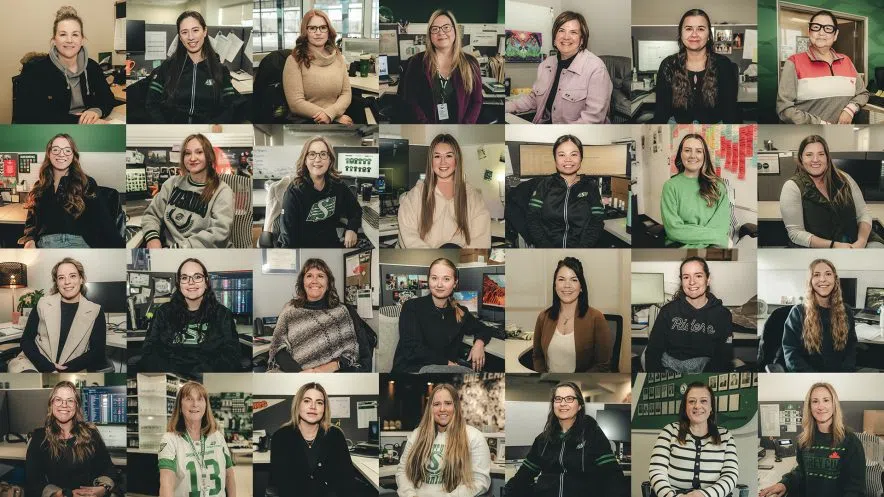
More than half of the team’s leadership and administrative staff is made up of women. Out of 49 people in key roles within the organization, 28 are female. (Saskatchewan Roughriders)
_____________________________________________________________
650 CKOM’s Brittany Caffet: What is your role with the team?
Arielle Zerr: If you hear a player’s voice in the media, if you see them in an interview on TV, I’ve probably arranged it. If they’re on the radio station that you’re listening to right now, I’ve probably arranged it. On top of that, I help prepare them to make sure they are putting their best selves in front of the public, basically just making sure that the club is presented in the best possible light by its stars and by its people.
Jennifer Senger: I oversee all aspects of ticketing, sales, pricing, customer experience. We’re the front line. We are usually where the customers first start their experience with the football club — buying a ticket. I develop strategies for all components, sales, for games and events, and lots of collaboration with other departments.
What motivated you to pursue a career in sports?
ZERR: I went into the media side first, and that was where the idea that I wanted to work in sports really started. I was covering the SJHL finals. It was a do-or-die game between the Humboldt Broncos and the Weyburn Red Wings. This was back in like the early 2010s, and there was a player who had scored to send it to game six, and the barn just erupted. I had to go across the ice to get him to do a post-game interview. He was so excited that he had scored this goal that he was switching between French and English and not realizing it. The emotion and the passion and the excitement and the feelings that come with sport… I just thought, ‘If I can be around this for the rest of my life, I will never feel like I’m working.’
SENGER: It wasn’t really the plan. Just being born in Saskatchewan, you learn just how important the Riders are to the province. It was a part of my childhood, whether that was at school or at home, and I just had an opportunity that came up, and I took it, and here we are! Twenty-two years later, I’m still here.
What do you love about being a woman working in sports?
ZERR: Showing that women can be as successful as men in sports. It’s an epic responsibility, but it really is a privilege. I think women in male dominated fields are able to bring unique perspectives. But I also think I probably enjoy the same thing that men enjoy about working in sport. You get to work with people who are at the pinnacle of their athletic ability and in their career, and you get to be part of something that people feel is so important and exciting.
SENGER: The people I get to work with every day. The fans. A lot of people are like, ‘Why have you stayed there that long?’ And I’m like, ‘Why not?’ I get to work in the stadium every single day with these people, for this team, for Rider Nation. I can honestly say I’ve never hated coming to my job. And that’s what keeps me going and makes me want to keep doing it until they tell me I can’t do it anymore.
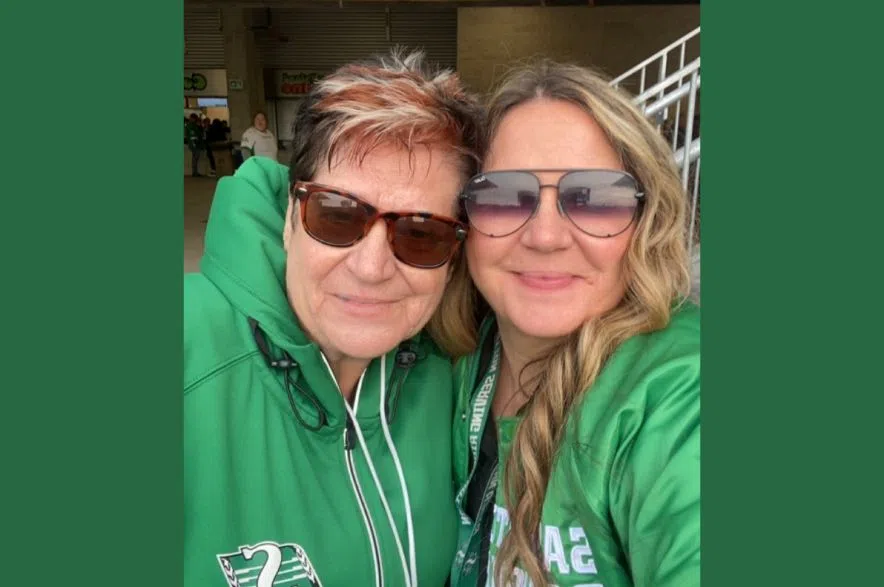
Senger cites Carol Hoeving as one of her role models in sports, having worked alongside her for 21 years in the Saskatchewan Roughriders’ ticketing department. (Saskatchewan Roughriders)
What are some challenges that you face, working in a male-dominated field?
ZERR: You have to be good. Not only good, but you have to be the best. Because if you’re not good, they may say it’s because you’re a woman, right? I do feel that there is an extra pressure when you are the first woman in a role, or you are a woman in a role that has traditionally been held by a man, that if it doesn’t go well they will not maybe hire a woman in that role again. There’s a lot of pressure that comes with that. Trevor Harris always says pressure is a privilege, but pressure is still pressure, right? I don’t just think about myself when I’m in this role. I do have in the back of my mind all the women that want to be in football and be in sport after me, and make sure that I have paved a way that is easier for them than it was for me when I started.
We’ve seen the league take major strides. I go on the road with the team, and there was never really a place for me to change after a game. I would go to one of the public washrooms. Just last year, the league put in a policy that there has to be a locker room for the women who travel with the teams to make sure that there’s a place where they can drop their stuff, get changed and take a shower. It seems like a very small thing, but sometimes I’d get on a plane sweaty from the game that day because there wasn’t that space set aside for me. That kind of stuff matters when you’re a woman, and it’s really great to see that continued evolution across the league.
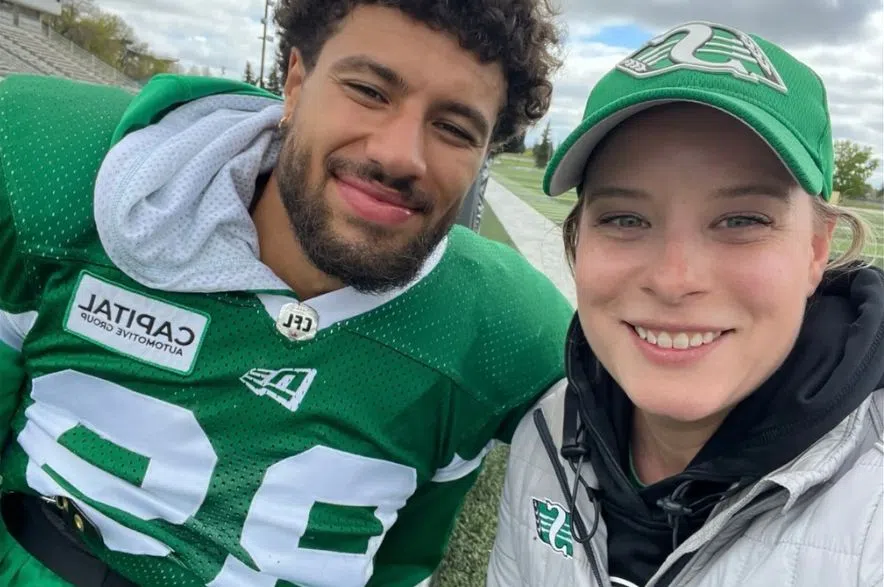
Zerr said she enjoys working in sport for the same reasons as many of her male counterparts — working with elite athletes and contributing to something fans feel passionate about. (Saskatchewan Roughriders)
SENGER: The challenges that women face in this industry have definitely evolved throughout my time. I would say that there is pressure. If I’m successful in my role, that might pave for another woman coming into this role. But I see that as opportunity as well, because then that gives me an opportunity to contribute to the progress for women in sport and women in these roles. I don’t know if the pressure I have on my shoulders is the role I have, or if it’s because I’m a woman. Within our organization, we have a lot of strong women. We have a lot of women in leadership roles. That’s where I think the industry needs to be better. It’s just hiring the right person. It’s not having a check box of making sure you got 50 per cent women or 10 per cent women. It’s hiring the best person for the role. And that when you’re sitting around a table and you’re giving information or feedback, that if it’s good, it’s not because you’re a woman, and if it’s bad, it’s not because you’re a woman.
What has been the most memorable moment or achievement in your career?
ZERR: I get a lot of joy and satisfaction out of just seeing the people around me succeed. When a player does their post-game media and they knock it out of the park, I feel really good about that. I feel really good when people are happy with the club and they’re talking about us in a positive way. Just being being able to be part of something and to help cultivate something that means so much to the people of this place is an achievement. I will always look back at this role and the way I was part of this organization as a great achievement in my life, regardless of if a championship ever comes again, though I’m hoping it will come very, very soon.
SENGER: It would be the Grey Cup championship in 2013 and winning it at home. It’s going to be hard to match that or to beat that!
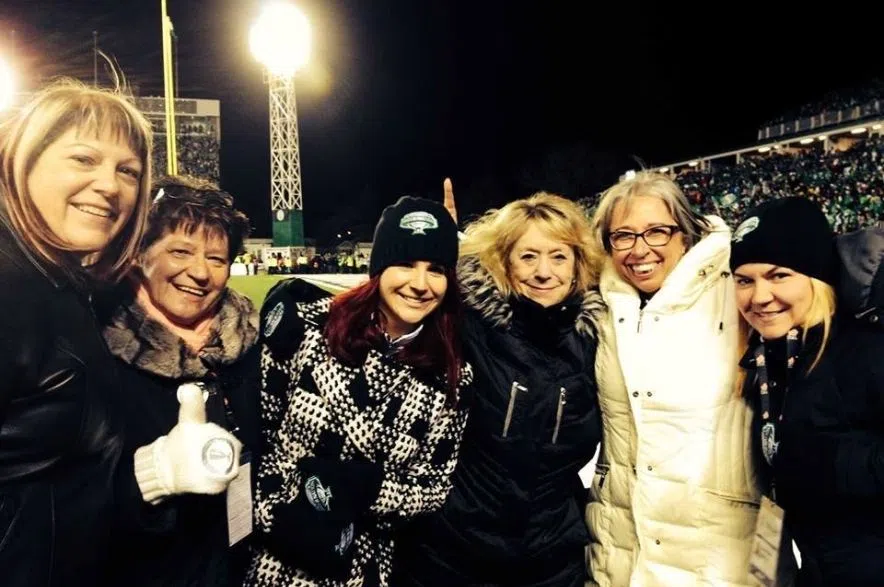
Senger said the most memorable moment of her 22 year career with the Saskatchewan Roughriders was winning the Grey Cup at home in 2013. Shelly Crooks, Carol Hoeving, Tia McNeil, Wendy Northwood, Gail Mund and Jenn Senger were all part of the ticketing team at the time of the big win. (Courtesy of the Saskatchewan Roughriders)
What are your hopes for the future for women in sports?
ZERR: Continuing to see the growth that we’ve seen, and I hope it starts to come at an accelerated level. Women’s sports leagues and the growth of people watching women’s sports, I think, will start showing that there doesn’t need to be a gender divide. Women are good at constructing teams. Women are good at coaching teams. Women are good in football administration. I think the next page of growth is on the operations side, and seeing more women coaches, more women general managers, more women scouts… the hands-on stuff.
SENGER: It might seem kind of simple, but I would just love to see one day where the headline doesn’t say ‘This is the first woman to be hired as a coach or hired as a ref, hired as this…’ Just announce her name in a role like anyone else. Don’t get me wrong, it makes me proud, but it’s 2025, and it’s time for it to be the norm instead of the exception.
What advice would you give to a young woman or girl who wants to work in sports?
ZERR: Be excellent at what you do, and believe that you’re excellent at what you do. Don’t be afraid to do it because no one’s done it before. Don’t be afraid to do it because you’ve never seen a woman do it before. You can do it. Don’t let anyone tell you you can’t.
SENGER: Just believe in yourself and go for it. Don’t let your doubt or your fear talk you out of it. If that’s what you want, jump in. And I actually told a woman that exact same thing at Saskatchewan Polytechnic last week who’s in the sport management course. She messaged me on LinkedIn after, and she actually applied for that job that she didn’t think that she’d be qualified for because she is a woman.
Editor’s note: The answers in this interview have been edited and condensed for clarity.
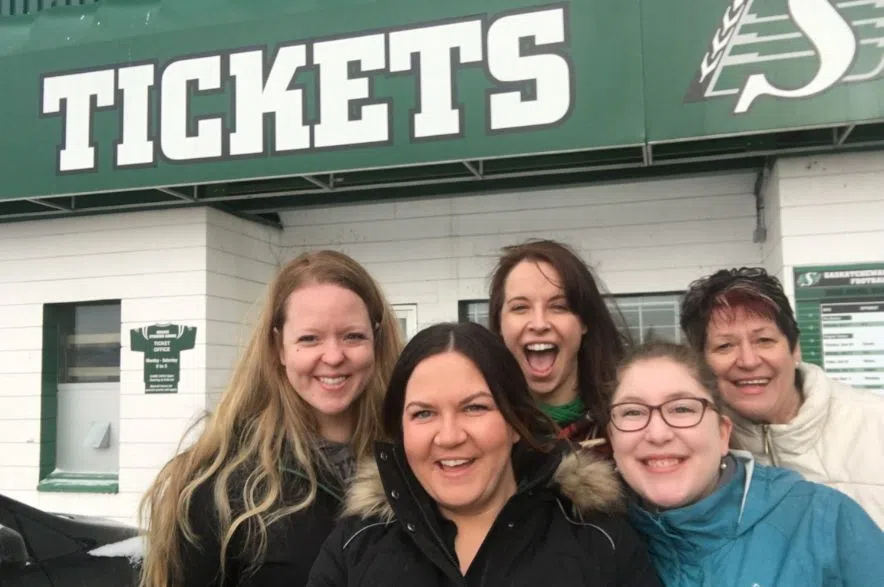
This photo was taken on Senger’s final day of work at the old Mosaic Stadium. The ticketing team, consisting of Amy Packham, Jenn Senger, Amy Kerr, Olivia Hompoth and Carol Hoeving were the last staff members to make the move to the new facility. (Saskatchewan Roughriders)
Game changers: Women who have helped shape the Riders’ legacy
The information on the slides below is courtesy of Rob Vanstone, senior journalist and historian for the Saskatchewan Roughriders.
